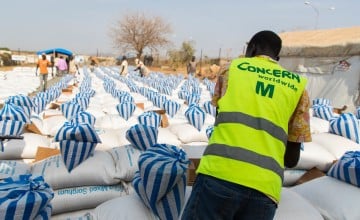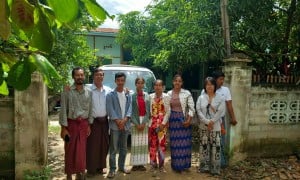
Read our 2024 annual report

Knowledge Hub
Multi-sectoral Emergency Response for Conflict-Affected and Food Insecure Populations in South Sudan - Final Evaluation 2019
The 2017-2018 Multi-sectoral Emergency Response for Conflict-Affected and Food Insecure Populations in South Sudan program provided assistance in the sectors of health, nutrition, WASH, Food Security and Livelihoods and shelter/Non-Food Items in the three former states of Northern Bahr el Ghazal, Unity, and Central Equatoria (Juba).

The key purpose of this internal evaluation was to establish the extent to which the integration approach with other sectors (Food security and livelihoods - FSL, water, sanitation and hygiene - WASH, Shelter and non-food items - NFIs) contributed to the health and nutrition status of the targeted population. The evaluation provides a holistic exploration of the 2017-2018 OFDA program rather than an in-depth analysis of sectoral achievements and impacts.
Findings
Overall, the evaluators found the program to be highly relevant and fit for purpose. It addressed the wide array of issues that affect the overall health and nutrition of extremely vulnerable populations in South Sudan and is well adapted to the different contexts where the program is implemented. The program is fully integrated with Concern’s overall emergency response in South Sudan, and is widely acknowledged by stakeholders as relevant and appropriate to address the urgent health and nutrition needs of the targeted population in all project areas through the provision of multi-faceted services, which is one of the greatest strengths of the program. It recognizes the relationship between health and nutrition and the provision of services like hygiene promotion, clean water, and improving agricultural production/food security in tackling malnutrition and other health related issues.
The program is deemed to be efficient in terms of budget utilization and adaptability. The activities were sufficiently resourced, and program management structures were adequate, responsive, and fit for purpose. The partnership with local South Sudanese NGO, Nile Hope, is commendable. Nile Hope is a critical partner for Concern because they are providing life-saving services in areas where other NGOs would struggle to operate, and more support should be provided to them to strengthen their finance and administrative systems. Despite the efficiency of the program, challenges remain, including staffing and procurement.
The program largely achieved the stated objectives and activities in the program proposal, contributed to saving lives of displaced people and communities affected by conflict and severe food insecurity in the areas of intervention. Thanks to the appropriateness of the intervention, timely delivery and effective synergies with other programs, Concern has, among other things, prevented children from dying due to malnutrition-related causes, provided clean water, and diversified diets through promotion of improved agriculture production techniques and diversified livelihood sources. The size and scale of the OFDA program provides an excellent foundation for other programs, and, without this program, Concern would not be able to implement many of the emergency components that it currently implements.
Though this program is a humanitarian program – life saving and short-term in nature – there are elements of sustainability. Most importantly, there has been an incredible amount of training provided across all of the sectors. Almost all of the program participants said that the knowledge and skills learned from the trainings provided by Concern will stay with them forever and they planned to or already had passed on the learning to others in their communities. Promotion and uptake of the community-led total sanitation (CLTS) approach by the target communities and the rehabilitation and development of WASH infrastructure also assure sustainability. However, the security situation in South Sudan is still quite volatile, and the sustainability of any program will be a challenge.
South Sudan is a challenging environment in which to implement programs. Yet, despite the difficult context, the Concern South Sudan team has been able to accomplish quite a lot under the 2017-2018 OFDA program. With the support of OFDA, Concern contributed to saving lives, alleviating suffering, and improved food security for thousands of South Sudanese. The program has lasting impacts, contributing to behavior change, reducing vulnerability, and increasing resilience to future shocks and stresses.
The multi-sectoral approach creates a mutually reinforcing program whereby the other sectors (WASH, FSL, Shelter, NFIs) contribute to the overall health and nutrition outcomes. The program recognizes that a holistic approach creates a healthier, more resilient population. Malnutrition is best treated and prevented when there is a better understanding of hygiene practices, exclusive breastfeeding, and dietary diversity, and when people have a roof over their heads and the basic necessities to survive.
Through the generous and continued funding from OFDA, Concern has been able to focus not just on activities but has been able to produce results. Continued support of this program ensures changes made in the day to day lives of South Sudanese will not be lost, even as unrest in the country continues. Without an end to the conflict, humanitarian assistance will be needed in the years to come.
This publication is made possible by the generous support of the American people through the United States Agency for International Development (USAID) Office of US Foreign Disaster Assistance (OFDA). The contents are the responsibility of Concern Worldwide and do not necessarily reflect the views of OFDA, USAID or the United States Government.




